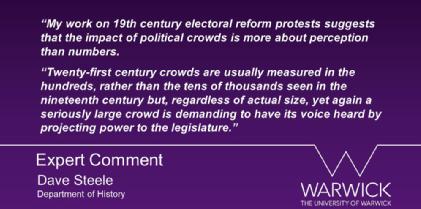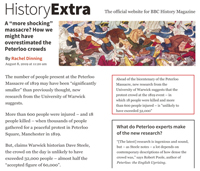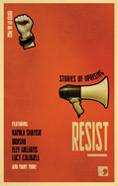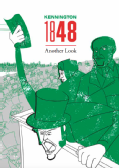Dave Steele
Dr Dave Steele Thesis: The Reputational Power of English Reform Crowds 1816 – 1848
Download: bit.ly/dr_dave_thesis

Great Chartist Gathering, Kennington Common, April 10 1848, Daguerrotype by William Kilburn (Digitally coloured)
My research is indicating that, from evidence that exists for confined areas such as Peterloo in 1819 and Kennington in 1848, reform crowds were significantly smaller than previously thought and are still perceived to have been massive by some historians.
But, despite crowds being numerically smaller than previously thought, reform campaigners were clearly successful in projecting an outward appearance of power. Consequently the state was regularly provoked into a disproportionate show of force and punitive legislation.
Impressions of crowds were often distorted through the lens of or newspapers and satirical prints. Gatherings were generally perceived to be massive by all protagonists. Why? I postulate that it suited the agenda of state and reformers alike to acknowledge crowds as massive as it was generally believed that magnitude signified power. Conceding smaller attendance could have been seen as weakening the potency of the reformers’ case for widening the franchise and, equally, undermining the state’s argument for punitive legislation and stern martial suppression.
Secondary research topics:
- When/how/why did the phenomenon of the pressure group/ demonstration start?
It could be argued that the Mass platform was a technique borrowed from the election hustings to give the disenfranchised a voice in the political process. - The dialectics of power
The unlikely emergence of working-class leaders such as Bamford, and Cuffay as well as some total eccentrics such as Reynolds often threw a ‘wild-card’ into the narrative.
The ensuing dialogue between this freshly empowered parvenu leadership and the eloquent and articulate middle class ‘old-guard’ fluctuated between good-natured co-operation and absolute schism.
- Power struggles
Power struggles were arising between the state and reformers, between voices of restraint vs escalation within the movement; within the government / magistracy/ military and police. There was also an ongoing debate within the machinery of state surrounding about the relative use of soft versus hard power. - Proxy Power
The delegation of power via other (local/regional) agencies of control such as magistrates, the military and (later) the newly formed police forces allowed the state to place a semblance of distance between their policies and their outcomes, effectively disassociating them from accountability. This ‘outsourcing’ of suppression could be seen as the projection of proxy power.
Conference Papers
17 June 2017 Rickmansworth - Chartism Day
‘Biscuits, Spirits and Salt-Pork: Military Provisioning for the Kennington Chartist Meeting, 1848’.
9 June 2017 Derby - Radicalism and Popular Protest in Britain, 1790-1820
‘Incitement vs Restraint in Early Nineteenth-Century Protest Crowds’
10 Nov 2018 The Politics of Sedition Conference, Warwick:
Unpacking the Emotions of the Crowd: ‘Using graphic imagery to scrutinize the agency of the individual in the long 19th century crowd’.
19 July 2019 Tolpuddle Radical History School: ‘Crowds and Power’
2 Aug 2019 International Conference on Romanticism, ‘Projecting Power: Examining the Mismatch between the Perception and Reality of the Mass Platform’
Citations
Robert Poole, Peterloo: the English Uprising (OUP, 2019)
Engagement
June 2018 - Finalist Warwick SkillsForge 3 Minute Thesis - <Play Audio>
May 19 2018 - Public lecture for Kennington Chartist Project at St Marks Church, Kennington <Play Audio>
Salt-Pork & Daguerreotypes – Unpacking archival evidence of the 1848 subjugation of Chartists.
March 2019 Article in: The Conversation 'People's Vote march: when it comes to crowds, history shows it's not all about size' Link opens in a new windowPeople's Vote march: when it comes to crowds, history shows it's not all about size'Link opens in a new window
March 2019 Asked to provide Expert Comment on People’s Vote March for Warwick Newsroom: bit.ly/2JG6PqJ 
Awards
June 2018 - Faculty Winner of SkillsForge Research Poster CompetitionLink opens in a new window

May 2018 - Awarded additional Royal Historical Society Funding to run conference: Politics of Sedition
February 2018 - Awarded joint Humanities Research Centre Doctoral Fellowship to run conference: Politics of Sedition
Education
PhD Candidate, University of Warwick, 2016-present
MA History, University of Warwick, 2010-2012
BA History, University of Warwick, 2004-2009
Unpublished work:
MA Dissertation - Public History:
A foot in both camps - Defining the role of the professional historian in the media age.
Download: goo.gl/Yv6JrZLink opens in a new window
MA Quantitative Research Essay:
An examination of the crowd size at the Peterloo Massacre
Download: bit.ly/2yMRfBp
MA Hanoverian Politics Essay:
To what extent does continuity rather than change define popular protest 1810-1840?
Download: goo.gl/zhNLgDLink opens in a new window

Dr Dave Steele dave dot steele at warwick dot ac dot uk
Honorary Research Fellow - Dept of History, University of Warwick
Associate Fellow - Royal Historical Society (RHS)
@dr_davesteele. +44 7706 674405
Published chapters in these books:
Order from Amazon Link opens in a new windowDownload a copyLink opens in a new window
Supervisor: Dr Sarah Richardson
History Extra Article on my research into the Peterloo Crowd SizeLink opens in a new window



